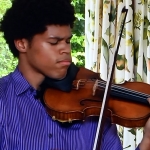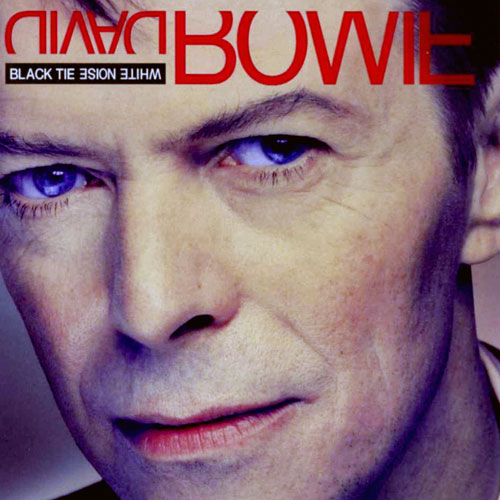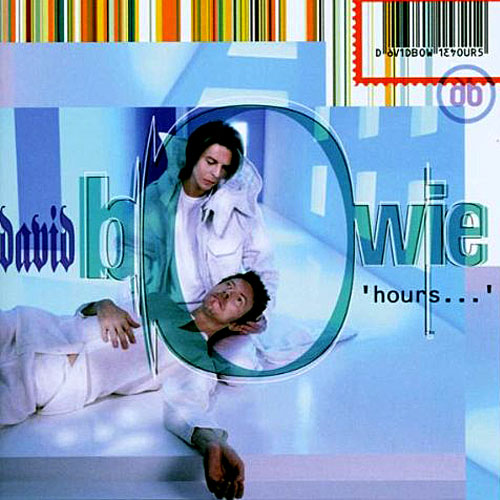David Bowie 1947-2016
The 90s
1993 brought the long-awaited return to solo projects Black Tie White Noise and one of rock’s first CD–ROMs entitled Jump. With Nile Rodgers again producing, the album came close to summing up every period of Bowie: with the opening instrumental The Wedding (inspired by Bowie’s own marriage to model Iman) offering a dance-and-house-inspired, brighter-toned return to the sound of Low; the single Jump They Say harking back to funkier times; and the old Cream tune I Feel Free marking a long-awaited reunion with Ziggy-era partner Mick Ronson (sadly, Ronson passed away soon after). Reaching No. 1 in the UK album charts, Black Tie White Noise reassured fans that Bowie’s creative curiosity was by no means exhausted.
By 1994, Bowie and Eno were again collaborating in the studio. The result was the concept album Outside released as part of a new deal with Virgin Records. This complex project touches on the increasing obsession with the human body as art and the paganization of western society. With its package-arts broken-down style, its haunted sound of ruin and its non-linear story-line of art, murder and technology, Outside predates the new sensibility of movies such as Seven, Copycat and the TV shows The X-Files and Millennium. As befits the multiphrenic nature of outsider art and emotion, Bowie sings in any number of voices: one minute the melodramatic crooner, another the stylized Londoner, another the quiet, intimate recluse of the Berlin years. Or, he is vari-speeded among the album’s seven characters. The song The Hearts Filthy Lesson, made the soundtrack of one of the biggest and darkest movie hits of that year in David Fincher’s Seven.
�
1996 was an extraordinarily active year even by David’s own feverish standards, switching styles and moods effortlessly, embarking on a confrontational tour around the US with Nine Inch Nails and performing acoustically with Neil Young and Pearl Jam at the Bridge Benefit Concert in San Francisco. He had a triumphant summer headlining Roskilde and the Phoenix Festival, and his electric performance at the VH-1 Fashion Awards on October 25, where he debuted his new single Little Wonder. Then there was the new album Earthling, all very direct, hard-hitting. The dramatic cover art featured David in an Alexander McQueen designed Union Jack coat in a slightly surreal British pastoral setting. The album arose out of the dynamic achieved and harnessed by the end of that summer’s tour. The band working on the projects featured Gail Ann Dorsey on bass and vocals, Mike Garson on keyboards, Reeves Gabrels on guitar and synths, and Zachary Alford on drums, the nucleus of the touring outfit. The record features the avant-garde drum-n-bass extravaganza and top 20 UK hit Little Wonder and the crushing Dead Man Walking, a reflection on getting older.
As always Bowie was at the cutting the edge with the first ever download of a song distributed through the internet in 1996, Telling Lies. 350 thousand young Americans downloaded a copy. A new age had begun and hardly anybody realised the ramifications, especially the luddite record company bosses of the time. Not for the last time, David was at least ten years ahead of the madding crowd.
�
The next year 1997 was to see a controversial collaboration with Eno in the shape of the I’m Afraid Of Americans single (“Not as hostile about Americans as Born In The USA” – Bowie).
This track, complete with the spontaneous Dom & Nic video that found Trent Reznor chasing David through the streets of Greenwich Village, hung around the US charts for three months, finishing the project on a real high. Despite the title, Bowie’s American influence seemed to be growing. He has been cited as a guiding star by The Smashing Pumpkins, Marilyn Manson and Nine Inch Nails, among others. He even reached into American film: the movie Basquiat, co-starring Gary Oldman, Christopher Walken and Dennis Hopper, saw him playing the character he immortalized in his 1972 song Andy Warhol. The film’s director was pre-eminent American painter, Julian Schnabel.
In January 1997, he celebrated his fiftieth birthday with an all-star performance at New York’s Madison Square Garden. He was joined on stage by old friends Lou Reed, Sonic Youth, Robert Smith, Billy Corgan, Foo Fighters and Frank Black, all of whom played and sang with David to make it one of his most memorable shows. Then he was off once again on a world tour that stormed over fifteen headlining festivals, countless theaters and clubs, and finished with a stadium tour of South America with Nine Inch Nails and No Doubt.
�
Already highly acclaimed in the fields of art and music, David has been turning his hand to mastering the information superhighway. 1998 saw the launch of BowieNet (www.davidbowie.com). BowieNet is the world’s first artist-created Internet service provider.
�
1999 was as busy a year as ever for Bowie. With his continuing work on his now highly acclaimed BowieNet website (a nominee for the 1999 WIRED Award for Best Entertainment Site of the Year), David has found time to work on a film Exhuming Mr. Rice, in which he plays the title role. The year also saw the launch of the David Bowie Radio Network on the Rolling Stone Radio website; this station runs 24 hours a day, 7 days a week. The station’s playlist includes 54 tracks, all personally picked and introduced by David. In May, David received an honorary doctorate in music from Berklee College of Music, Boston. In the past, this prestigious doctorate has also been received by BB King, Sting, James Taylor, Dizzy Gillespie and Quincy Jones. David also made a well publicised and successful foray in the art world with an acclaimed exhibition at the Cork Street Gallery in London. As well as finding time to pick up the Legion d’honneur Award in France.
1999 also saw the growing relationship between David and Placebo flourish. At the annual BRIT Awards ceremony, David joined the band for a performance of the Marc Bolan classic Twentieth Century Boy. The performance went down so well with the public that the Mirror newspaper began a mini-campaign for the track to be released as a single and it was not long before the two artists were to team again.
July saw David voted as the biggest music star of the 20th century, beating Mick Jagger and Noel Gallagher, by readers of The Sun newspaper. In the same month David was voted the sixth Greatest Star of The Century by Q Magazine and its readers. In this poll David was the third highest-ranking star who is still alive.
Most importantly October 1999 saw the release of a brand new studio album. Hours… which was David’s twenty-third solo album, harkening a return to the sounds of the Hunky Dory days. Written solely with long-time collaborator Reeves Gabrels over the last year, Hours… could be described as one of David’s most autobiographical records to date. Tracks include Thursday’s Child, Survive and The Dreamers. The themes of loss and regret throughout the album are likely to strike hearts universally. With such personal lyrics as “Sometimes I cry my heart to sleep,” David is evoking emotions recognizable to us all. This album deals more with real life opposed to imagery and fantasy.
�
The Hours… touring schedule ended in spectacular style with David headlining the closing night of the 2000 Glastonbury festival in front of an estimated 150,000 people. Reportedly the largest attendance at the event ever and a far cry from an earlier appearance at the inaugural Glastonbury with Hawkwind in front of a couple of thousand people. Backstage catering consisted of milk and cheese in Michael Eavis kitchen then. This time, the banners fluttered in the wind and the crowd stretched as far as the eye could see. A 21 song set saw David open with Wild is the Wind and finished with the ambiguously titled I’m afraid of Americans. A fitting close to what was a spectacular year.
|
|

|

Bloc Party |
LATEST GALLERY IMAGES

Where Israel Goes, Misery Follows 
The Kanneh-Masons |
|
|



